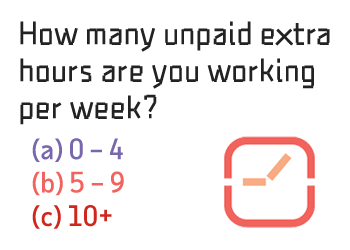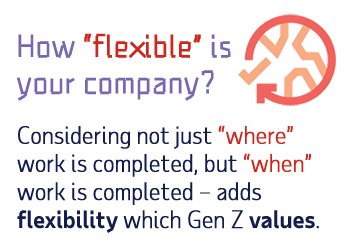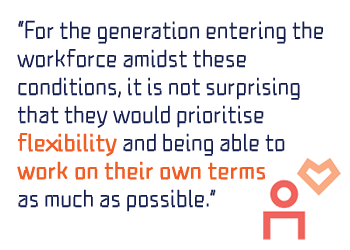People at Work 2021: Will Gen Z workers break the 9-to-6 workday?
- HRM Asia Newsroom

Generation Z employees are entering the workforce amidst a disruption to our work model on a scale never seen before. It is natural that expectations of work for this generation, sometimes referred to as “zoomers,” have pivoted compared to previous generations.
Breaking with tradition
One way Gen Z workers are paving the way towards changing expectations of work in Singapore is that they are less likely to choose full-time work amidst a rise in employer scrutiny according to the study by the ADP Research Institute, People at Work 2021: A Global Workforce View.
As a sign of change to the prevailing work culture in Singapore, only around half (54%) of Gen Z workers (aged 18-24) would choose to work in full-time traditional employment over part-time or contract roles, compared to a national average 76%.
The study also revealed the reasons why Gen Z would care for part-time or contract employment, a third (32%) cited concerns about the job security offered by traditional employment as compared to gig work or freelancing. One in four (24%) also reported a change in personal priorities and needs as a driving factor.
Gen Z workers are less likely to want a return to the office than older workers, signaling changes in where work may be completed. Just over a quarter (26%) of Gen Z workers want a complete return to the office, while in other age segments, 36% of ages 45-54 and 45% of ages over 55 years choose this option.
These factors have led to Gen Z breaking traditional expectations, including the 9-to-6 working model and the office as a centralised work location. Should HR leaders be concerned their newest employees are at risk of not fitting a traditional work model?
Maybe not, as the youngest Gen Z workers are digital natives and it is expected there is a lower barrier for them to shift to remote work. With employees in Singapore working an average of 9.4 unpaid hours per week, up from 7.3 hours pre-pandemic, and 31% working more than 10 hours of unpaid overtime weekly (19% up from pre-pandemic), there are indications that workers are adapting and putting in the time necessary to be secure and successful.

“There has been widespread disruption to the 9-to-6 working model. Workers are now routinely clocking up what amounts to more than a full working days’ worth of unpaid overtime every single week. Many may be going the extra mile due to concerns about their job security, to compensate when colleagues have lost their jobs,” noted Peter Hadley, President, Asia Pacific at ADP.
Consider “flexibility” in two dimensions instead of one
While workers put in those extra unpaid hours, Gen Z is prioritising working on their own terms, seeking flexibility, and driving interest in options beyond traditional full-time work. A quarter (26%) of Gen Z respondents in Singapore cited changes in their personal priorities as the reason for their increasing interest in contract work.

Prioritising flexibility throws the role of the office as “where” work happens into flux. Increasing digitisation in many industries also impacts “when” work can be completed. With employer expectations for productivity at an all-time high, Gen Z workers are taking on being productive at both a time and a place that fits with their other priorities.
Companies remain focused on traditional productivity measurements with 54% of employers monitoring timekeeping and attendance of employees more closely than ever, and while flexible work arrangements are available, 46% of employees feel “judged” for using them.

– Peter Hadley, President, Asia Pacific, ADP
“For the generation entering the workforce amidst these conditions, it is not surprising that they would prioritise flexibility and being able to work on their own terms as much as possible. Employers and workers considering a hybrid working model post-pandemic should not simply assume it will guarantee the “best of both worlds.” However, that is not to say that effective workplace flexibility is out of reach,” said Hadley.
Implications for leaders
While Gen Z is breaking some norms, only 20% responded they had no professional impact from the pandemic just as they get started in their career, highlighting the importance of leaders working with them in organisational structure to help reduce negative implications.
READ: People at Work: A Workforce View 2021
“There are still many questions around the extent to which working from home will remain the norm, for full or part of the week, and what that might mean for productivity, team building, staff development and career progression, as well as office space requirements. For younger workers especially, who will be charting the course of our workforce’s future, there is a need for two-way communication on their unique needs with employers, in order to find the best solution moving forward,” concluded Hadley.






